The perfect short-haul holiday by month (and no flight required)

Even before this summer’s flight chaos, many of us have been looking for ways to avoid flying – whether that’s because we want to travel more sustainably, because travelling to an airport isn’t convenient, or simply because short-haul air travel has plumbed new depths in terms of comfort, reliability, and enjoyment.
While flight-free travel is not necessarily cheaper and the logistics can require time, effort and meticulous planning, the advantages are many. Decades of air travel has rewired our brains. We’ve grown used to cramming as many trips and experiences as possible into our annual allowance and regard the journey as little more than a chore. As several of these holidays demonstrate, by travelling slowly you’ll see more of the country you’re visiting – and possibly others en route. Whether you’re with a partner, family or friends, a long train journey or boat trip offers the opportunity to connect with your travel companions in a different way. And what child doesn’t enjoy a train journey in a different country?
The main deterrent to “slow travel” is time. If a week’s R&R on a beach is what’s needed, of course you just want to get there. But cruises from UK ports can also get you to the sun, and a proliferation of night-train routes in Europe is making rail travel more seamless than ever. Why overnight in a hotel when you can roll into your destination a day earlier, by train? Austria’s rail carrier OBB launched its EuroNight service last month, making it possible to travel from London to Stockholm in a day (24 hours), and also operates Nightjet – a growing network of sleeper trains fanning out across Europe, with 33 more trains due to be rolled out over the next two years.
Eurostar and Eurotunnel services are also a great alternative to flying. A journey on Eurotunnel – which carries bicycles, cars, motorbikes, campervans and caravans between Folkestone and Calais in 35 minutes – could save you a small fortune on car-hire. Short Stay Saver fares, valid for five consecutive days, start from £84 per vehicle, and you can take a pet for £22.
Compared with most short-haul flights, which pile on the extras, ferry travel also offers good value for money, with several passengers per car and luggage included (duty-free shopping applies in the Channel Islands as well as the EU). Discover Ferries, which aggregates the services of 13 ferry lines, offers more than 80 routes across the British Isles and Europe, from the Isles of Scilly to Santander, in Spain.
Dubious about ferry travel? Certain ferries offer premium lounges, spa treatments, fine dining, cinemas, pools and pet-friendly berths, and you could even find yourself getting involved in wildlife spotting. Wildlife charity ORCA, which works to protect the whales, dolphins and porpoises found in UK and European waters, sends its volunteer Marine Mammal Survey Teams on board P&O Ferries, Brittany Ferries, Caledonian MacBrayne, Isles of Scilly Travel and Northlink Ferries (Orkney and Shetland), and logged an incredible 14,112 sightings last year. If that doesn’t tempt you to ditch the plane, nothing will.
January
Austria
With the potential to build in one or two extra days on the slopes, overnight rail travel has always been an attractive prospect for skiers. Using Austria’s network of Nightjet sleeper routes, it is now possible to reach Austrian ski resorts, by combining them with Eurostar and Thalys or ICE services. Board the NightJet from Cologne, and you could be waking up in Landeck and breathing crisp Tyrolean air by mid-morning.
Snow-sure Ischgl, in the Tyrolean Alps, has a sophisticated lift system, wide, confidence-boosting pistes and runs for all abilities. Away from the slopes, there are snowshoe trails, miles of cross-country ski terrain and one of the longest night-run toboggan rides in the Alps. A new spa resort, Silvretta, will open this winter, with indoor and outdoor pools and an ice rink that loops around the building’s circumference. Enjoy the luxury of an extra day on the slopes before catching the Nightjet back to Cologne.
How to do it: Seven nights’ B&B at the Hotel Garni Sport Sonneck in Ischgl costs from £353pp (sport-sonneck.at). Take the train from London St Pancras to Cologne (via Brussels); then Cologne to Innsbruck on the Nightjet and change at Innsbruck for Landeck-Zams (book via The Travel Bureau, thetravelbureau.co.uk). A 30-minute taxi ride from Landeck to Ischgl costs £21pp.

February
Sweden
The Scandinavian concept of friluftsliv – “outdoor living” – was popularised by the Norwegian playwright Henrik Ibsen, who used the term to describe the value of spending time in remote locations for spiritual and physical wellbeing. This trip from Slow Adventure to the region of Jämtland Härjedalen offers a deep dive into winter culture and offers friluftsliv, hygge and winter romance at its best. Go cross-country skiing, learn how to build a snow bivouac, go ice-skating on a frozen lake and tackle ice-climbing on a frozen waterfall with mountaineer expert, guide and lodge host, Jon.
Hygge kicks in late afternoon with wood-fired saunas and fine-dining in a cosy mountain lodge. The region’s forests, lakes and mountains are home to elk, reindeer, wolverines, bears, arctic foxes, musk oxen and rare birds, and Slow Adventure donates five per cent of each booking to local causes – in this case, maintenance of hiking trails and helping to protect the wild musk ox.
How to do it: A four-night Swedish Midwinter Friluftsliv and Hygge trip costs from £1,451pp (0800 861 1624; slow-adventure.com), departing on February 9, 2023. Take the EuroNight service from London to Stockholm (one-way fares from £100.96; trainline.com), then continue from Stockholm to Östersund by day or night train (rail.cc). From Östersund take the bus to Funäsdalen (3hr15m; mohlinsexpressbuss.se) where the Friluftsliv and Hygge trip begins.

March
The Netherlands
Think cycling holidays aren’t for you? This relaxing bike and barge trip to Holland is ideal for occasional cyclists, and the scenery will have you leapfrogging into spring. There are visits to the North Holland Dune Reserve and the world’s largest flower auction at Aalsmeer and a cycle ride to Keukenhof flower park in Lisse, where seven million bulbs will have burst into carpets of hyacinths, daffodils, orchids, roses, carnations, irises, lilies and tulips.
You’ll sleep on a comfy and contemporary 36-passenger Dutch barge, which has a restaurant and bar and a hot tub on a teak sundeck. One afternoon the barge berths in historical Haarlem, home to the Frans Hals and Teylers museums. Amble around the Grote Markt (Great market) under the imposing Bavo Cathedral and then find a bar or café on the lively Botermarkt and watch life go by.
How to do it: A five-day Tulip Tour costs from £924pp (0191 265 1110; skedaddle.com) departing on March 30, 2023. Includes full board on the Magnifique IV barge, guided cycling, city tours and entry fees. Per-trip bike rental £65pp; e-bikes £150pp.
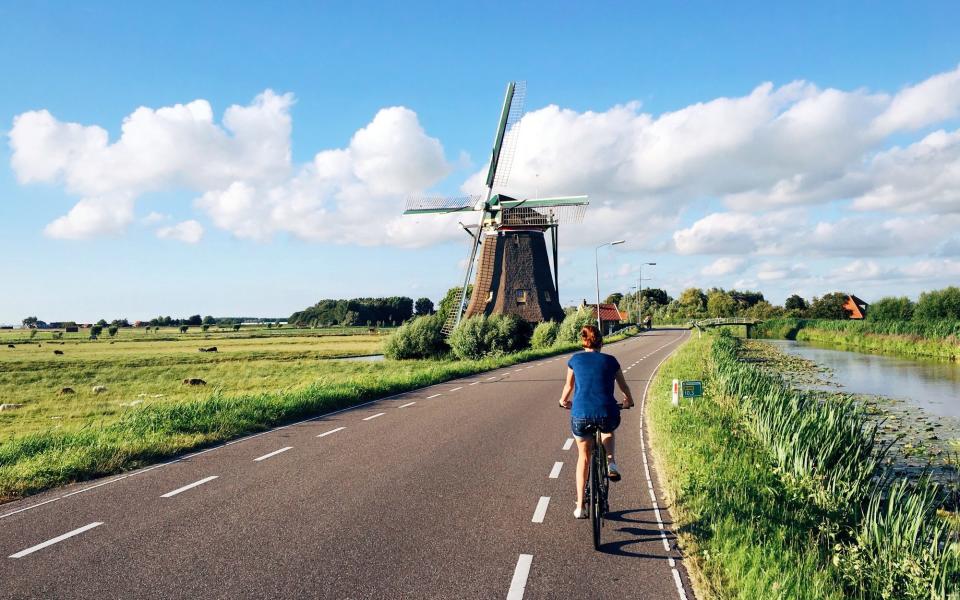
April
Sicily
This slow trip to Sicily via Paris, Turin and Rome, includes a rare opportunity to cross the sea on board a train ferry and to circumnavigate Mount Etna on the narrow-gauge Ferrovia Circumetnea. Other seat-side highlights include sliding past the French Alps between Chambéry and Modane, admiring the rolling Tuscan hills and the Apennines, north of Rome, and a journey through Sicily’s heartland, to hilltop Enna.
At Villa San Giovanni the overnight sleeper (you’ll board in Rome) rolls onto a ferry to cross the Straits of Messina – passengers can leave the train and head to the viewing deck for the dawn approach to the Sicilian coast. The tour of Sicily begins in Enna and continues to Cefalu, the elegant seaside city of Syracuse and Catania, where you make your way back to Paris, via Rome, Turin and Milan. Accommodation is in small hotels and cosy B&Bs.
How to do it: A 14-night Sicily by Train and Ferry holiday costs from £1,674pp (020 4525 6215; byway.travel), including return rail and ferry travel from London to Sicily, 11 nights’ accommodation with breakfast, and a personalised trip planner (including bus timetables, taxi numbers, restaurant favourites and maps).
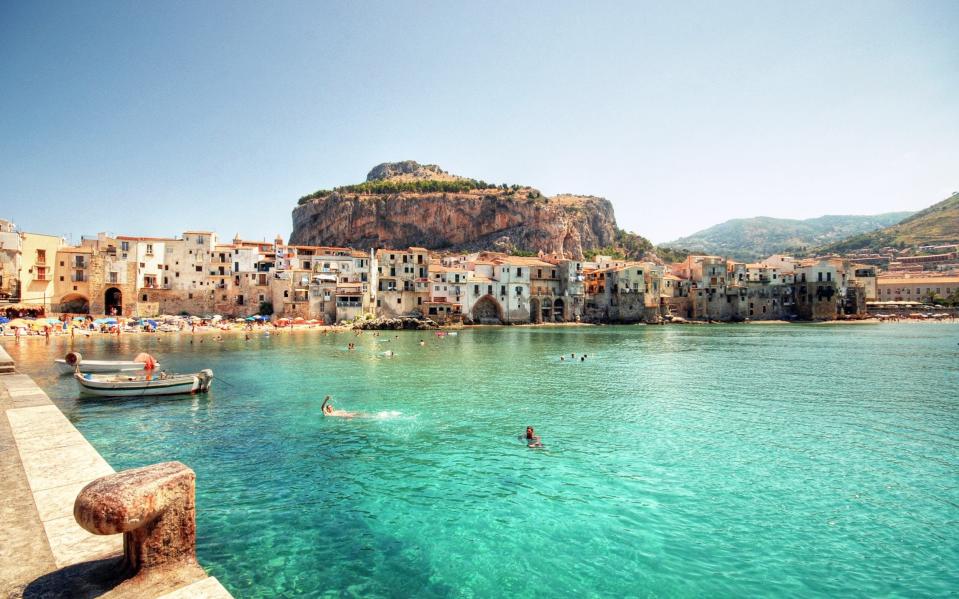
May
France
With two Flemish-baroque squares, a host of specialist food shops, an exceptional Saturday-morning market and a moving WWI battle site, the capital of France’s Pas-de-Calais region, Arras, has all the ingredients for an enjoyable spring break or long weekend. The city is less than 90 minutes’ drive from the Eurotunnel terminal at Calais, so you could be ordering one of the region’s robust stews or a planche (cheese or charcuterie board) by noon.
Climb the Unesco-listed town-hall Belfry for panoramic views, sip coffee in the flamboyant Place des Héros, visit a wine cellar – Le dame Jeanne has a wide selection of organic and biodynamic wines by the glass – and head below ground to the recently renovated Wellington Quarry for a thought-provoking tribute to the Battle of Arras. The Mercure Arras Centre Gare is within walking distance of the historic centre and has parking.
How to do it: One-way fares on Eurotunnel Le Shuttle start from £87 per vehicle (up to nine passengers; eurotunnel.com), or travel from Dover with DFDS, Irish Ferries and P&O Ferries (one-way fares from £68 for one car and up to four adults on DFDS; discoverferries.com). Journey times are 35 mins and 90 mins respectively.

June
Ireland
The best time to be in Ireland? When there’s a food or music festival going on. This new, self-guided walking holiday around Ireland’s rugged west coast dovetails with a “trad” (traditional tunes and songs) music festival in County Clare and visits the remote Aran islands and The Burren – a lunar-like landscape that spills into the Atlantic near Galway Bay. Speckled with fossils the bald limestone expanse hosts Arctic and Alpine flora as well as Mediterranean plants. A walk from the Cliffs of Moher to Doolin takes in the Aran Islands, Galway Bay and on a clear day, the hills of Connemara.
Bed and breakfasts in Doolin and Ballyvaughan anchor your 31-mile walk and as this is Wild Atlantic Way territory you can expect plenty of oysters, beech-smoked salmon and mussels. You’re never far from a flute or a fiddle in Doolin, and June’s folk festival is a fantastic time to experience the traditional sessions. After a pint or two of Doolin’s creamy, red, Irish ale, perhaps you’ll join in.
How to do it: A seven-day Walking Ireland’s West Coast tour costs from £625pp (0141 530 5452; macsadventure.com). Includes B&B accommodation, luggage transfers, transfers and an information pack and app.
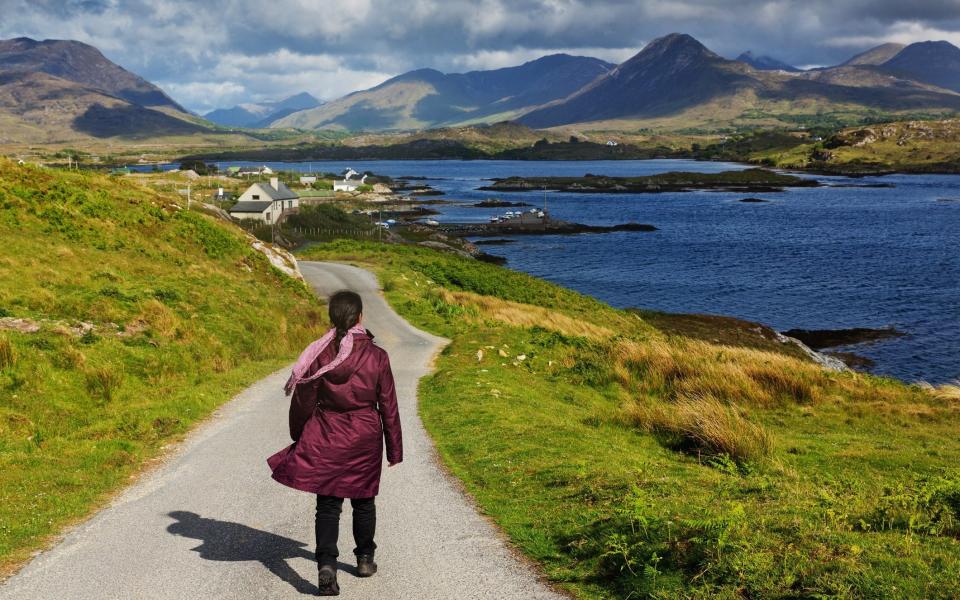
July
Iceland
Long hours of daylight and warmer temperatures make July the ideal time to explore the wild and remote roof of Europe. Most of the fun on this trip to Iceland and the Faroe Islands is in getting there. Highlights include two nights in the emerging cultural powerhouse of Aarhus in Denmark, a cycle ride to the wild beaches and forests of the Jutland Peninsula, and three days in the remote capital of Tórshavn in the Faroe Islands, where you can explore the city’s old town, marina and museums, take a boat trip to the Vestmanna Sea Cliffs and head to the largest island, Streymoy, to see nesting puffins.
From Tórshavn, the journey continues on a ferry bound for the small east-coast Icelandic town of Seyðisfjörður. In Iceland you’ll pick up a car for a scenic three-day coastal drive to Reykjavik, via Höfn, Vic, Vatnajökull National Park and Gullfoss.
At Vatnajökull there is an opportunity to go on a guided glacier walk, using crampons and an ice axe. The North Atlantic adventure winds up in the Icelandic capital where you can check out the music and pub scene, explore the Old Harbour and Art Museum and slather yourself in silica at the geothermal Blue Lagoon spa.
How to do it: A 15-day Flight Free England to Iceland holiday costs from £3,279pp (01273 823 700; responsibletravel.com) including accommodation, tours and return rail and ferry transport. Take the Eurostar to Brussels; ICE high-speed train to Cologne, a connecting intercity service to Hamburg (overnight in Hamburg), train to Aarhus (four and a half hours), ferry to the Faroes and an overnight ferry on to Iceland.
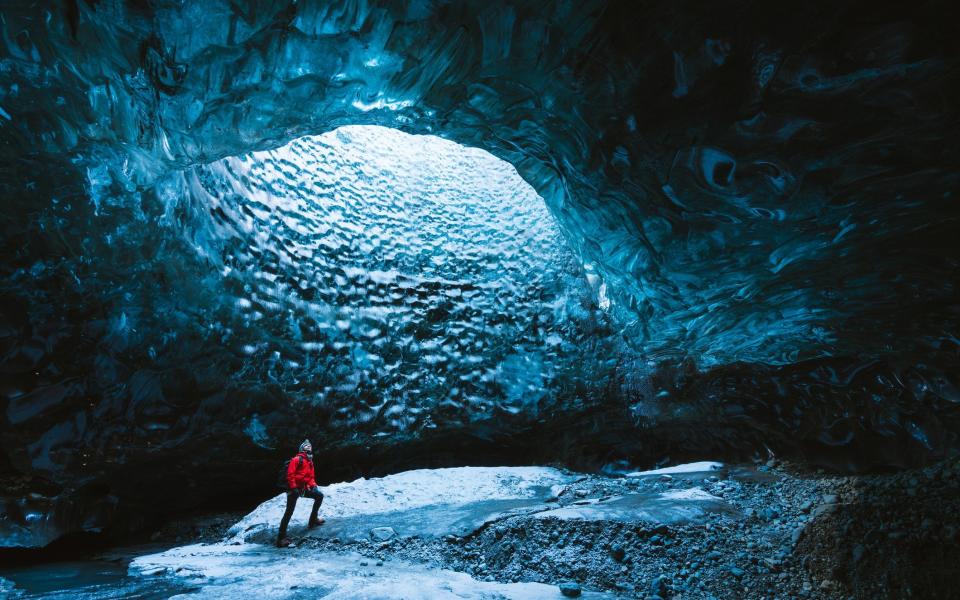
August
Norway
“I’m bored,” said no child, on a Disney cruise. Non-stop entertainment, immersive Disney experiences, splash zones, wading pools, first-run Disney movies, dedicated menus, well-orchestrated clubs for children of all ages plus adults-only pools, bars and restaurants make the line a solid choice for families. Next summer Disney Dream, which also has the AquaDuck water-coaster, will sail from Southampton to the Norwegian fjords calling at Amsterdam, Nordfjordeid, Skjolden and Sandnes.
In Nordfjord, ride the Loen Skylift above the fjord to Mt Hoven or take the children to the Sagastad Viking Centre to meet the Viking king Audbjørn and stand at the steering oar of Norway’s largest known Viking ship. In Sandnes pick up a rental bike from the tourist information centre and head off for a gentle peddle along the green route.
How to do it: A seven-night Norwegian Fjords Cruise on Disney Dream round-trip from Southampton, departing August 19, 2023, costs from £1,704pp (0800 171 2317; disneycruise.com). Based on two adults and two children (aged 3-9) sharing a cabin.

September
Spain
Cooler temperatures combined with the mellow golds of the wine harvest make September a great time to visit the Rioja wine region. This self-drive itinerary coincides with the festival of San Mateo and wine-harvest festivities that are celebrated in the regional capital, Logrono. September 21 sees the crushing of the grapes when children fill a barrel with the first produce of the season.
The route via Portsmouth and Bilbao pauses at vineyards and wine museums, takes in the golden beaches of San Sebastian, and threads through the historic cities of Santo Domingo de la Calzada and Calahorra, a cork’s throw from some of Spain’s top wineries. Accommodation is a mix of paradors and hotels and includes the Hotel Miro in Bilbao, opposite Gehry’s whimsical Guggenheim.
How to do it: A nine-night self-drive holiday costs from £1,215pp (020 8125 4219; wexas.com) including return ferry crossing in a two-berth cabin, car hire from Bilbao Port and six nights’ B&B accommodation.

October
Channel Islands
The fishing calendar decrees that seafood is in season during months with an “R”, which makes autumn a great time to visit the British Isles’ largest cultivator of oysters. Jersey’s “Tennerfest” also means October is an affordable time to tuck in: for six weeks from October 1, chefs across Jersey and Guernsey plate up some of the finest seafood the islands can muster, on fixed-price menus starting at £10. Pair a glass or two of the local sparkling dry white, Le Mourier, with some Jersey rock oysters.
In tandem with “Tennerfest”, Condor Breaks has bonus night deals at hotels and B&Bs across the Channel Islands in September and October – including half term. In Jersey try kayaking, cave exploring or surfing, and visit the vineyards and cider orchards. There are boat trips to the Ecrehous islands to look for Atlantic Grey Seals, and RIB rides from St Peter Port on Guernsey to spot dolphins and puffins.
How to do it A three-night break at the four-star Greenhills Country Hotel, close to La Mare Wine Estate, costs from £405pp (0345 609 1024; condorferries.co.uk) including return ferry crossing with a standard-sized car.

November
The Netherlands
What if you could linger at Rembrandt’s Night Watch with a drink and canape in hand or explore the Pipe Museum, set in a spooky canal house, after dark? Whether admiring Dutch greats at the Rijksmuseum or the works of Matisse and Mondrian at the Stedelijk, it’s impossible to do justice to Amsterdam’s wealth of galleries and museums. In November Museum Night Amsterdam (museumnacht.amsterdam) offers one-wristband access to around 60 museums for less than 25 euros. Not only are exhibits open until 2am but there is the added draw of live music, DJ sets, food and drink and surprise performances.
This year’s events include a torchlit tour of the Rijksmuseum’s gardens and the opportunity to order a cocktail from the Deadly Drinks cocktail bar, and create your own pre-post-mortem portrait at Museum So Far. Families should add the NEMO Science Museum and Tropenmuseum to the list. Both offer hands-on exhibits and the Tropenmuseum is housed in one of the most beautiful museum buildings in the Netherlands.
How to do it: Take the ferry from Newcastle to Ijmuden, the port for Amsterdam (dfds.com) or travel by Eurostar (eurostar.com) from London St Pancras.

December
Germany
Several European cities put on a great festive show this month, but no-one does Christmas markets quite like Germany, which wraps up Christmas and ties it with a lavish bow. This rail and coach trip visits Dusseldorf and the Glastonbury of Christkindlmarkets, Cologne, where markets fill the historic centre and spill into the veedel (city quarters). The Old Town market, Altstadt, has long ice-skating straights and lanes where you can try your hand with a curling broom. Refuel with specialty sausage, gingerbread and steaming strudels.
In Dusseldorf, there are stalls hosted by woodturners, painters, pewterers and glassblowers, and there’s an opportunity to learn more about the history of glass at the Kunstpalast art museum, which has an impressive collection of Renaissance art and a specialist collection of glass, in the Glasmuseum Hentrich. Leger Holidays has convenient, countrywide departure points.
How to do it: A three-night Düsseldorf and Cologne Christmas Markets tour costs from £409pp; single supplement £69 (01709 385 811; leger.co.uk), staying at the four-star Wyndham Garden Düsseldorf Mettmann and travelling in Silver Service class, with armchair-style seats and seatback TV. Departs December 8, 2023.
Tried and tested: How we booked a no-fly holiday to Spain and the Balearics
“Flying would’ve been cheaper and quicker but nowhere near as much fun,” says Karen Rippon, who – along with her husband Philip – embarked on a no-fly holiday to the Balearic Islands this summer. The month-long trip in August took the retirees to three European cities, with 10-day villa rental on the island of Menorca and two nights in Mallorca – all booked independently using rail, ferry and hotel websites.
Travelling from London on Eurostar, they overnighted in Paris at the Mercure Paris Gare de Lyon ahead of a 10.10am departure from Gare de Lyon to Barcelona Sants (Sants Estación) the following morning, booked via Trainline (6hrs 45 min; trainline.com). “The most scenic part of this journey was from Montpellier along the coast to Barcelona,” explained Karen. “We were surprised to find no restaurant car, but the train did have a well-stocked buffet car and trolley service.”
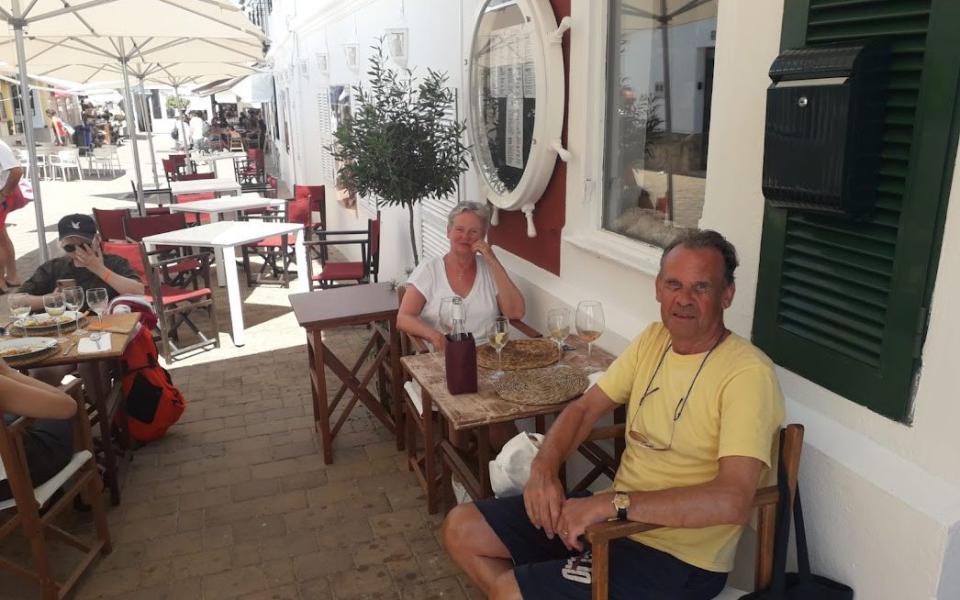
The couple spent the night at a city-centre hotel in Barcelona and spent the next day exploring the city, before taking an overnight ferry (£130 return via Direct Ferries; directferries.com) from Barcelona Ferry Port onwards to Menorca – a crossing which takes between four and eight hours, depending whether you are travelling to Mahon or Ciutadella, on the west coast.
Departing at 9.45pm, the Rippons opted for Ciutadella, arriving at 06.45 the following morning and heading straight for their rented villa, found via booking.com. “We probably looked at about 15 villas before we booked,” said Karen. “We chose a location near the old town of Ciutadella and close to four beaches in Cala en Blanes. From here we took day trips on the excellent local buses to the capital Mahon and the picturesque village of Fornells.”
They also took a two-night side-trip to Mallorca, sailing by ferry from Ciutadella to Alcúdia (1hr 15min) and on to Palma by bus. “There were a few small delays, but these were insignificant compared to airports and airlines. Rather than being a chore, the journey was very much part of the holiday. We will definitely consider this type of adventure again.”

 Yahoo Movies
Yahoo Movies 
